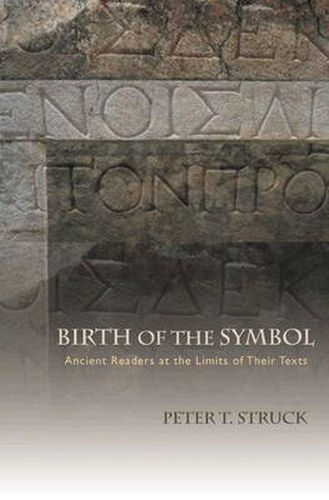Readings Newsletter
Become a Readings Member to make your shopping experience even easier.
Sign in or sign up for free!
You’re not far away from qualifying for FREE standard shipping within Australia
You’ve qualified for FREE standard shipping within Australia
The cart is loading…






Nearly all of us have studied poetry and been taught to look for the symbolic as well as literal meaning of the text. Is this the way the ancients saw poetry? In Birth of the Symbol , Peter Struck explores the ancient Greek literary critics and theorists who invented the idea of the poetic ‘symbol’. This book notes that Aristotle and his followers did not discuss the use of poetic symbolism. Rather, a different group of Greek thinkers - the allegorists - were the first to develop the notion. Struck extensively revisits the work of the great allegorists, which has been underappreciated. He links their interest in symbolism to the importance of divination and magic in ancient times, and he demonstrates how important symbolism became when they thought about religion and philosophy. ‘They see the whole of great poetic language as deeply figurative’, he writes, ‘with the potential always, even in the most mundane details, to be freighted with hidden messages’. Birth of the Symbol offers a new understanding of the role of poetry in the life of ideas in ancient Greece. Moreover, it demonstrates a connection between the way we understand poetry and the way it was understood by important thinkers in ancient times.
$9.00 standard shipping within Australia
FREE standard shipping within Australia for orders over $100.00
Express & International shipping calculated at checkout
Nearly all of us have studied poetry and been taught to look for the symbolic as well as literal meaning of the text. Is this the way the ancients saw poetry? In Birth of the Symbol , Peter Struck explores the ancient Greek literary critics and theorists who invented the idea of the poetic ‘symbol’. This book notes that Aristotle and his followers did not discuss the use of poetic symbolism. Rather, a different group of Greek thinkers - the allegorists - were the first to develop the notion. Struck extensively revisits the work of the great allegorists, which has been underappreciated. He links their interest in symbolism to the importance of divination and magic in ancient times, and he demonstrates how important symbolism became when they thought about religion and philosophy. ‘They see the whole of great poetic language as deeply figurative’, he writes, ‘with the potential always, even in the most mundane details, to be freighted with hidden messages’. Birth of the Symbol offers a new understanding of the role of poetry in the life of ideas in ancient Greece. Moreover, it demonstrates a connection between the way we understand poetry and the way it was understood by important thinkers in ancient times.